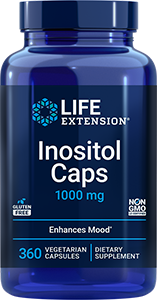
6 Benefits of Inositol
Published: July 2023
Let's face it: the past few years have been, to put it mildly, pretty rough. You can be excused for feeling down, and maybe eating more sugary foods than you used to. But despite these strange times we find ourselves in, we only have one body and one mind—so it's up to you to take care of them!
Thankfully, there are lots of ways we can care for our physical and mental health. And while it may sound cliché, a balanced diet and exercise are still your go-to playbook! But there are other tools we can use to give ourselves little boosts—and who doesn't love a multi-purpose tool?
Inositol is a noteworthy supplement because not only can it benefit your physical health, like metabolic and cardiovascular health, but it may also boost your mental health. Let's take a look at inositol and its various health benefits.
What is inositol?
Inositol is a compound that is found in abundance in the human body. It serves numerous roles, including mediating cell signaling (that is, how cells communicate and respond to stimuli). Inositol is used in the body for many purposes, including maintaining health blood sugar levels, forming cell membranes, and modulating neurotransmitters.
A quick chemistry lesson: There are actually nine forms of inositol. The differences among them have to do with the arrangement of their atoms. The most famous (and health-boosting!) forms of inositol are called myo-inositol and D-chiro-inositol. Myo-inositol is made mostly in the kidneys from glucose—a whopping two grams or more each day. Meanwhile, a small amount of this myo-inositol is converted to D-chiro-inositol. Inositol supplementation utilizes both or either of these forms.
6 benefits of inositol
Inositol is naturally made inside your body, but myo-inositol supplementation is pretty popular—and for good reason! Inositol supplements have been used in many studies for a wide variety of health reasons.
Here are some of the top health benefits of inositol supplements:
1. Encourages healthy blood sugar levels
Perhaps one of inositol's better-known benefits is its ability to encourage healthy blood sugar levels. Both myo-inositol and D-chiro-inositol are involved in insulin signaling and sensitivity. Myo-inositol has been shown in clinical studies to promote healthy blood sugar levels, and to support healthy glucose metabolism. Some studies combine myo-inositol and D-chiro-inositol, or include other B vitamins like folic acid, but inositol alone appears to consistently promote healthy glucose metabolism.
2. May help improve mood
There's no doubt that mood and mental health are complicated, with a plethora of physiological and environmental contributors. There are several famous key neurotransmitters involved with mental health, like serotonin, dopamine, and norepinephrine—all of which may be affected by inositol and its derivatives. It's been suggested that inositol supports receptors in the brain that bind to these neurotransmitters, potentially improving mood.
This is great news, because feeling blue, whether a specific life event or just in general, can have a cascading effect on all aspects of your well-being. When we're down, healthy habits like eating a balanced diet and getting enough exercise can seem like insurmountable obstacles. That's part of the reason why weight management can be so difficult—mood and metabolic health are inextricably linked. Fortunately, myo-inositol has been shown in clinical studies to boost mood when taken in higher doses, and it has the added benefit of promoting metabolic health. Win-win!
3. Supports skin health
Another aspect of your health that is linked to mood and metabolic health is your skin. Hormonal changes, stress, and other situations can impact your glowing complexion—which in turn can cause further stress! Inositol has been shown to support healthy skin appearance in clinical studies.
Explore Our Best Mood Support Supplements
4. May bolster reproductive and hormonal health
Fertility on your mind? Follicle-stimulating hormone, or FSH, is a hormone that is essential for ovarian function and supporting the menstrual cycle in women and stimulating sperm production in men. Myo-inositol interacts with FSH, while the D-chiro form promotes healthy estrogen and testosterone levels. As such, inositol has been successfully used to support balanced hormones, mostly in women. (Although there is some emerging research that suggests inositol could support men's reproductive and hormonal health as well!)
Women who have taken inositol (as myo-inositol, with or without D-chiro-inositol and/or folic acid) have experienced healthy levels of progesterone, prolactin, adiponectin, and testosterone, as well as normalized menstrual cycles. Myo-inositol may also help improve mood around the time of menstruation.
5. May promote healthy body weight
Weight loss is a highly complex topic. There are numerous factors that can contribute to a person's weight and their ability to lose it. Of course, the best way to maintain a healthy body weight is by eating a healthy, balanced diet and getting plenty of exercise. But for many people, diet and exercise doesn't yield the results they want, and there are many ways we can offer our bodies additional encouragement. One of them is by supplementing with inositol.
You've probably come across terms like "brown" or "white" fat—and certain nutrients that can induce the "browning" of white fat. Generally speaking, brown fat is the one you want, because it burns energy, while white fat stores energy. And when you're trying to shed pounds, you definitely want to burn energy! Both myo-inositol and D-chiro-inositol have been shown to encourage the conversion of white fat to brown fat. And in multiple clinical studies, myo-inositol has been shown to help support a healthy body weight.
6. Supports cardiovascular health
Coming in strong with benefit #6—cardiovascular health! From maintaining healthy blood pressure to normal cholesterol levels, inositol may help support that all-important ticker. Clinical studies have shown that myo-inositol encourages already-healthy blood lipid levels, blood pressure, and the "good" cholesterol HDL.
Can you supplement with inositol?
Absolutely! Inositol supplements have been safely used for decades, and they are well-tolerated. Just remember to discuss your supplements with your healthcare provider—they can help you create a plan to tackle any health-related concerns that is tailor-made for you.
Is inositol a vitamin?
No. Inositol used to be referred to as "vitamin B8," but although it is vitamin-like, in the way that it has far-reaching whole-body health benefits, it is not actually a vitamin. Vitamins are essential nutrients, meaning they must be obtained from your diet, as your body cannot make enough on its own. On the other hand, the body can make enough inositol—although it can also be obtained from diet and inositol supplements.
How to take inositol
As with any dietary supplement, it is important to follow the product label or take as directed by a healthcare provider. Inositol supplements are available as myo-inositol, a mixture of myo- and D-chiro-inositol in different ratios, or potentially with other nutrients. Keep in mind the correct scientifically supported doses, and keep your doctor informed! Inositol supplements can be taken with or without food, although taking with food may help prevent minor gastrointestinal upset.
What foods contain inositol?
While myo-inositol supplementation is a convenient way to ensure your body gets enough inositol, you can also obtain this nutrient from foods. Myo-inositol can be found in fresh fruits and vegetables, beans, grains, and nuts. Cantaloupe and citrus fruits have high levels of myo-inositol, while peas rule the vegetables in inositol content.
Oats and bran have more myo-inositol than other grains. D-chiro-inositol can be found in soybeans and legumes, as well as in oranges, ginseng, and arrowroot. Pro tip: Oats make a delicious and nutrient-packed meal! Throw in some cut-up fruit like cantaloupe, and you're well on your way to an inositol-full breakfast that will keep you satisfied and maybe even boost your mood.
Getting enough inositol is definitely doable. Of course, you can always opt for supplementation, if these high-myo-inositol foods aren't on your daily menu. However you get your fill of this nutrient, if you're looking to boost your mood, support healthy blood glucose, or promote reproductive health, then inositol is a standout ingredient that should be on your radar.
References
- Chatree, S. et al. "Role of Inositols and Inositol Phosphates in Energy Metabolism." Molecules (Basel, Switzerland). November 2020. https://www.ncbi.nlm.nih.gov/pmc/articles/PMC7663797/
- Concerto, C. et al. "Neurobiology and Applications of Inositol in Psychiatry: A Narrative Review." Current Issues in Molecular Biology. February 2023. https://www.ncbi.nlm.nih.gov/pmc/articles/PMC9955821/
- DiNicolantonio, J.J. and J.H. O'Keefe. "Myo-inositol for insulin resistance, metabolic syndrome, polycystic ovary syndrome and gestational diabetes." Open Heart. March 2022. https://www.ncbi.nlm.nih.gov/pmc/articles/PMC8896029/
- Giordano, D. et al. "Effects of myo-inositol supplementation in postmenopausal women with metabolic syndrome: a perspective, randomized, placebo-controlled study." Menopause. January 2011. https://pubmed.ncbi.nlm.nih.gov/20811299/
- Greff, Dorina et al. "Inositol is an effective and safe treatment in polycystic ovary syndrome: a systematic review and meta-analysis of randomized controlled trials." Reproductive Biology and Endocrinology. January 2023. https://www.ncbi.nlm.nih.gov/pmc/articles/PMC9878965/
- Jafferany, M. "Lithium and psoriasis: what primary care and family physicians should know." Primary Care Companion to the Journal of Clinical Psychiatry. 2008. https://www.ncbi.nlm.nih.gov/pmc/articles/PMC2644475/
- Kiani, A.K. et al. "From Myo-inositol to D-chiro-inositol molecular pathways." Eur Rev Med Pharmacol Sci. March 2021. https://pubmed.ncbi.nlm.nih.gov/33755975/
- Mukai, T. et al. "A meta-analysis of inositol for depression and anxiety disorders." Human Psychopharmacology. January 2014. https://pubmed.ncbi.nlm.nih.gov/24424706/
- Nas, K. and L. Tűű. "A comparative study between myo-inositol and metformin in the treatment of insulin-resistant women." European Review for Medical and Pharmacological Sciences. June 2017. https://pubmed.ncbi.nlm.nih.gov/28724173/
- Pezza, M. and V. Carlomagno. "Inositol in women suffering from acne and PCOS: a randomized study." Glob Dermatol. 2017. https://www.oatext.com/Inositol-in-women-suffering-from-acne-and-PCOS-a-randomized-study.php
- Shokrpour, M. et al. "Comparison of myo-inositol and metformin on glycemic control, lipid profiles, and gene expression related to insulin and lipid metabolism in women with polycystic ovary syndrome: a randomized controlled clinical trial." Gynecological Endocrinology. May 2019. https://pubmed.ncbi.nlm.nih.gov/30608001/
- Soldat-Stanković, V. et al. The effect of metformin and myoinositol on metabolic outcomes in women with polycystic ovary syndrome: role of body mass and adiponectin in a randomized controlled trial. J Endocrinol Invest. 2022 March. https://pubmed.ncbi.nlm.nih.gov/34665453/
- Zarezadeh, M. et al. "Inositol supplementation and body mass index: A systematic review and meta-analysis of randomized clinical trials." Obesity Science & Practice. October 2021. https://www.ncbi.nlm.nih.gov/pmc/articles/PMC9159559/
- "Inositol." ScienceDirect. https://www.sciencedirect.com/topics/nursing-and-health-professions/inositol
Always be in the know!
Access the latest deals, wellness news, expert health tips & more!









